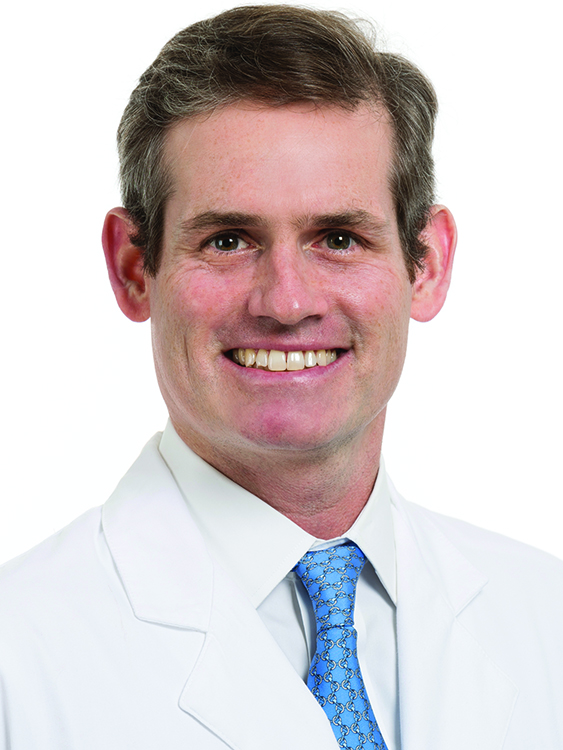More than 1 million hernias are repaired every year in the United States, according to the Food and Drug Administration. Surgery is almost always the necessary treatment.
Although few of us are excited for surgery, surgeon Dr. Thomas Gavigan of Novant Health Carolina Surgical - Randolph believes it’s better to have a hernia repaired on your terms and your schedule than to wait for an urgent or emergency repair. Here’s why.
What exactly is a hernia?
Hernias are extremely common. They can occur at many spots on the abdomen. The most common is an inguinal or groin hernia, which occurs in roughly 25% of men and 3% of women.
A hernia occurs when an organ or fatty tissue protrudes into an area of the body where it shouldn’t, due to a weakness in the abdominal wall layers. That weakness may be due to a birth defect, or could have occurred through injury, straining during bowel movements, “wear and tear” from aging, pregnancy, obesity, or recurrent coughing and sneezing.
A primary care doctor can help you detect conditions early.
As the weak tissue gives way, the organ or fatty tissue pushes through the abdominal wall, creating a bulge — typically in the abdomen or groin.
What are the symptoms of a hernia?
Symptoms of hernias include discomfort, pain, swelling, bulging or pressure in the area surrounding the hernia. Pain often gets worse with movement. Many people with a hernia will notice a visible bulge that may protrude more when they do certain activities, although not everyone has a bulge.
How do your treat a hernia?
No matter what caused your hernia or where it’s located, surgery will eventually be required. Hernias do not improve on their own, and may increase in size and discomfort, limiting your activities.
Is it OK to put off hernia surgery?
While “watchful waiting” may be appropriate for a short time, leaving your hernia untreated puts you at risk for an emergency. The main risk is that the exposed organ or fatty tissue from your hernia can become stuck and lose blood supply, putting you at risk for injury or perforation.
When this happens, emergency surgery becomes necessary — and often involves repairing more than just the hernia but also the contents of the hernia, increasing the complexity of the surgery, recovery time and risk for complications.
Electively repairing your hernia — when you can choose your surgeon, discuss the surgical options, and pick a date that works for your schedule — just makes sense. You can return to desired activities more quickly and function better. You will have less risk of pain or discomfort, and less risk of an emergency.
Surgeons can repair your hernia using a variety of techniques. All approaches utilize anesthesia for a safer patient experience.
Different types of hernia surgery and what to expect
Laparoscopic or minimally invasive approach
In the “inside” approach, also called minimally invasive, laparoscopic or robotically assisted surgery, your surgeon will use a camera and surgical tools that provides a view of the layers of the abdominal wall during the operation.
Once the surgeon is your abdomen, he or she uses a pressure system to temporarily expand your inner abdominal wall (sort of like blowing up a balloon), then uses the newfound space created to find the defective area and repair it. This type of surgery is often performed with robotic assistance, resulting in very small incisions usually just a few millimeters in size. This allows for less pain after surgery, quicker recovery, a lower chance of infection and a faster return to work.
Contact us for a hernia consult today
Greater Charlotte region
Novant Health Carolina Surgical - Matthews: 704-316-5653
Novant Health Carolina Surgical - Randolph: 704-377-3900
Novant Health Salisbury Surgical Associates: 704-637-2750
Greater Winston-Salem region
Novant Health Salem Surgical Associates - Winston-Salem: 336-765-5221
Novant Health Salem Surgical Associates - Clemmons: 336-765-5221
Novant Health Salem Surgical Associates - Kernersville: 336-564-4873
Greater Wilmington region
Novant Health Surgical Associates – 910-721-4000
Novant Health General Surgery & Bariatrics – Wilmington: 910-662-9384
The 'outside' approach
In the “outside” approach, also called an “open hernia repair,” your surgeon will create a slightly larger incision at the site of the hernia (typically, a few centimeters), then go in and repair the hernia. This can result in a bigger scar and a more pain after surgery, but it is often a more appropriate choice for people who have already had multiple abdominal surgeries or who are not a candidate for general anesthesia.
When your surgeon repairs your hernia using either approach, the goal is to close the defective layers of abdomen wall back together without tension. The surgeon will use sterile surgical mesh as a buttress to reinforce the layers so they don’t open back up again.
Is an overnight hospital stay required after hernia surgery?
Most elective hernia surgeries can be performed in an outpatient setting. The more complex and recurrent hernia repairs may require a short hospital stay. This will be determined by your surgeon before your surgery.
Your surgeon will give you specific discharge directions based on the type of procedure you had. You will be restricted from heavy lifting, swimming and strenuous activity. However, you will be encouraged to perform many of your usual activities, especially walking, starting the day of surgery. You may be out of work for one to two weeks depending on how physical your job is.
Both surgical approaches are safe and effective. Your surgeon will help you choose the approach that is right for you based on your overall health, medical history and your wishes. After your consult, the surgeon you meet with may do the surgery themselves, or refer you to a surgical colleague who has more experience with your desired type of procedure.
If you choose to do this surgery in an elective setting — instead of waiting for an emergency — you have the opportunity to talk about all of these factors.
What kind of surgeon performs hernia surgery?
If you have a hernia, you may not need to treat it immediately — but you will need to treat it eventually. Ask your primary care clinician to refer you to a general surgeon who specializes in hernia care so you can talk about what may work best for you.










